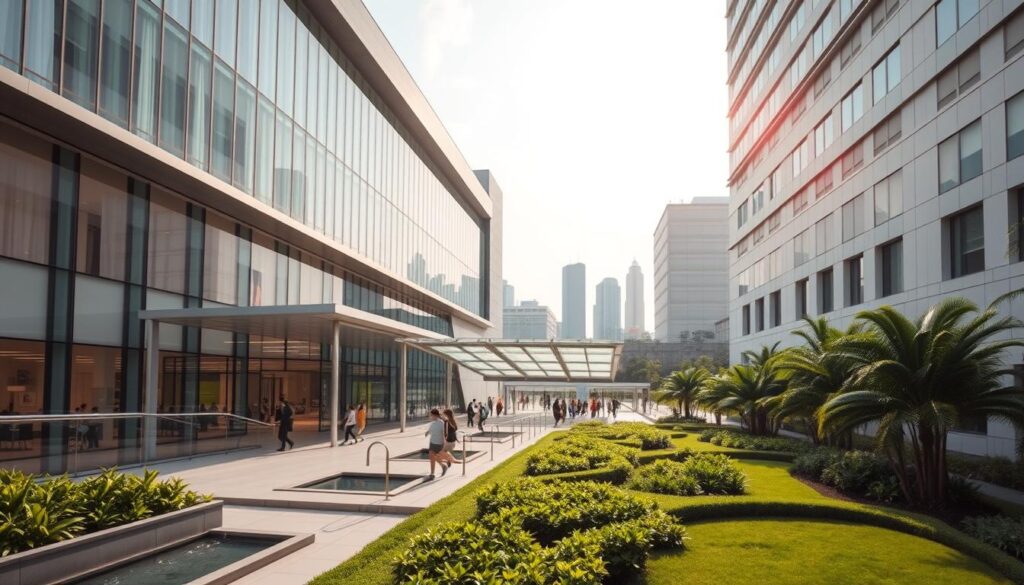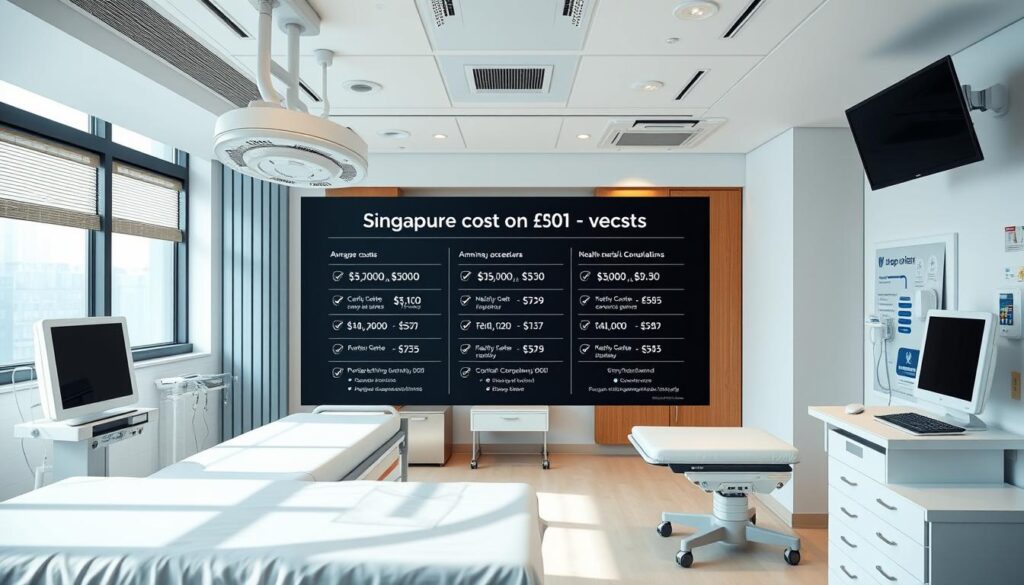Singapore is renowned for its world-class healthcare system. In 2000, the World Health Organization ranked it 6th globally, reflecting its commitment to excellence. By 2014, Bloomberg named it the most efficient healthcare system worldwide. The country also ranks as the 4th healthiest globally, making it a trusted destination for medical needs.
Many top facilities here hold Joint Commission International (JCI) accreditation, ensuring high standards of care. Singapore’s blood bank system is also recognized as one of the safest globally. Patients benefit from advanced treatments and technologies, often at a fraction of the cost compared to the US or Europe.
Leading institutions like Mount Elizabeth, Gleneagles, and Singapore General Hospital offer specialized services. These facilities combine expertise, cutting-edge technology, and compassionate care to meet diverse patient needs.
Key Takeaways
- Singapore ranks 6th globally for healthcare by WHO.
- Bloomberg named it the most efficient healthcare system in 2014.
- Top facilities hold JCI accreditation for quality assurance.
- The country has one of the safest blood bank systems worldwide.
- Cost-effective treatments compared to the US and Europe.
- Leading institutions include Mount Elizabeth and Gleneagles.
Introduction to Singapore’s Healthcare System
Singapore’s healthcare system stands out as a model of efficiency and innovation. The country combines a dual public-private system, ensuring accessibility and affordability for all. Government subsidies play a key role in making medical services accessible to residents while maintaining high standards.
Overview of Singapore’s Healthcare Excellence
Singapore’s Ministry of Health regulates both public and private hospitals, ensuring consistent quality. The unique financing model has earned recognition from global organizations like Towers Watson. This approach focuses on community health outcomes and cost-effective care.
Facilities like Mount Elizabeth Novena showcase the country’s commitment to innovation. With 333 beds and hybrid operating theaters, it offers advanced surgical solutions. Similarly, Thomson Medical specializes in IVF treatments, providing hope to families worldwide.
Why Singapore is a Global Leader in Medical Tourism
Before the pandemic, Singapore welcomed 1.3 million medical tourists annually. The world-class facilities and expertise attract patients seeking specialized care. Parkway East Hospital, for example, offers 24/7 emergency services, ensuring round-the-clock support.
Farrer Park Hospital takes a unique approach with its integrated medical-hotel complex. This setup combines comfort with cutting-edge treatments, making it a preferred choice for international patients. Singapore’s healthcare system continues to set benchmarks globally, blending quality, innovation, and patient-centric care.
What Makes a Hospital the Best in Singapore?
When evaluating top-tier healthcare facilities, certain factors set them apart. These include advanced technology, highly skilled doctors, and a focus on patient-centered medical care. Understanding these elements helps identify institutions that truly excel.

Key Factors to Consider
Capacity and specialties play a significant role in defining a facility’s capabilities. For instance, Mount Elizabeth offers 345 beds, while Tan Tock Seng boasts 1,700 beds, catering to different patient volumes. Institutions like Gleneagles are known for their transplant units, showcasing their specialties.
Technological advancements also matter. Raffles Hospital, for example, is a leader in robotic surgery, ensuring precision and faster recovery. Neonatal Intensive Care Units (NICUs) across public and private institutions adhere to high standards, providing critical care for newborns.
Accreditations and Recognitions
Accreditations like Joint Commission International (JCI) ensure adherence to strict infection control and surgical safety protocols. Singapore General Hospital (SGH) ranks 9th globally in Newsweek’s 2023 list, reflecting its commitment to quality.
National University Hospital (NUH) holds the 96th global position, supported by its academic research partnerships. Additionally, 80% of specialists in these facilities hold international fellowships, further solidifying their expertise.
Top Hospitals in Singapore: A Comprehensive Roundup
Singapore’s healthcare landscape is defined by its exceptional institutions. These facilities combine advanced technology, skilled professionals, and patient-centered care to deliver outstanding outcomes. Below, we explore some of the leading medical centers that set the standard for excellence.
Mount Elizabeth Hospital
Mount Elizabeth Hospital is renowned for its luxurious amenities and specialized care. The Royal Suite offers patients a comfortable and private environment, complete with personalized services. With a focus on cardiology, oncology, and orthopedics, this facility attracts patients seeking advanced treatments.
Gleneagles Hospital
Gleneagles Hospital stands out for its 270-bed capacity and VIP interpretation services. Its 16-bed ICU ensures critical care for patients, while air evacuation services cater to international clients. Known for its transplant units, Gleneagles is a leader in complex medical procedures.
National University Hospital
The National University Hospital (NUH) excels in pediatric care, particularly its bone marrow transplant program. As a teaching hospital, NUH integrates academic research with clinical practice, ensuring cutting-edge treatments for patients of all ages.
Singapore General Hospital
Singapore General Hospital (SGH) is a pioneer in cancer treatment, offering proton therapy at its dedicated center. With 40 clinical specialties and 9 operating theaters, SGH provides comprehensive care for a wide range of medical conditions.
Tan Tock Seng Hospital
Tan Tock Seng Hospital (TTSH) is a leader in infectious disease management, especially post-COVID. Handling 100 daily trauma cases, TTSH also specializes in robotic rehabilitation, ensuring patients regain mobility and independence.
| Hospital | Specialties | Unique Features |
|---|---|---|
| Mount Elizabeth Hospital | Cardiology, Oncology, Orthopedics | Royal Suite amenities |
| Gleneagles Hospital | Transplant Units, Critical Care | 16-bed ICU, Air evacuation |
| National University Hospital | Pediatrics, Bone Marrow Transplants | Academic research integration |
| Singapore General Hospital | Cancer Treatment, Proton Therapy | 40 clinical specialties |
| Tan Tock Seng Hospital | Infectious Diseases, Trauma Care | Robotic rehabilitation |
Advanced Medical Services Offered
Singapore’s healthcare facilities are equipped with cutting-edge technology and specialized services. These institutions combine innovation with expertise to deliver exceptional patient outcomes. From advanced surgical procedures to state-of-the-art diagnostic tools, they set the standard for modern healthcare.

Specialized Treatments and Surgeries
Mount Elizabeth Novena stands out with its neurological operating room featuring intraoperative MRI. This technology allows surgeons to perform precise brain surgeries with real-time imaging. Farrer Park Hospital offers a nuclear medicine suite and radiation oncology, providing comprehensive cancer treatment options.
Khoo Teck Puat Hospital is another leader with its 795-bed smart hospital design. The facility integrates technology to enhance patient care and operational efficiency. These advancements ensure that patients receive the most effective and timely treatments available.
State-of-the-Art Facilities
Parkway East Hospital is recognized for its BFHI-certified maternity wards, ensuring the highest standards for maternal and newborn care. National University Hospital (NUH) uses 3D-printed orthopedic implants, offering customized solutions for complex cases.
Changi General Hospital’s JCI-accredited stroke unit provides rapid and effective care for stroke patients. Raffles Hospital leverages AI-powered diagnostics to improve accuracy and speed in identifying medical conditions. These facilities exemplify Singapore’s commitment to innovation in healthcare.
| Facility | Specialized Service | Unique Feature |
|---|---|---|
| Mount Elizabeth Novena | Neurological Surgery | Intraoperative MRI |
| Farrer Park Hospital | Cancer Treatment | Nuclear Medicine Suite |
| Khoo Teck Puat Hospital | Smart Hospital Design | 795 Beds |
| Parkway East Hospital | Maternity Care | BFHI Certification |
| National University Hospital | Orthopedic Implants | 3D Printing Technology |
| Changi General Hospital | Stroke Care | JCI Accreditation |
| Raffles Hospital | Diagnostics | AI-Powered Tools |
Patient Care and Services
Singapore’s healthcare system prioritizes patient care and tailored services for all. From locals to international visitors, every individual receives personalized attention and support. This commitment to excellence ensures a seamless experience from consultation to recovery.

Exceptional Patient Experience
Facilities like Mount Elizabeth and Gleneagles focus on creating a comfortable environment for patients. Mount Elizabeth’s MPAC program offers 12-language support, ensuring clear communication for foreigners. Gleneagles provides visa assistance and a medical concierge to simplify the process for international visitors.
Post-surgery care is equally prioritized. Thomson Medical designs customized nutrition plans to aid recovery. Airport pickup services are available for medical tourists, making their journey hassle-free. These amenities reflect Singapore’s dedication to a holistic patient care approach.
International Patient Services
Singapore’s healthcare facilities cater to the unique needs of foreigners. Private suites offer luxurious amenities, while subsidized wards ensure affordability without compromising quality. Insurance direct billing options are available, reducing financial stress for international patients.
Specialized packages, such as fertility treatments, often include accommodation for convenience. Facilities also provide Ramadan-friendly meal services, respecting cultural preferences. These thoughtful touches make Singapore a preferred destination for medical tourism.
- Mount Elizabeth’s MPAC program offers 12-language support.
- Gleneagles provides visa assistance and medical concierge services.
- Thomson Medical designs post-surgery nutrition plans.
- Airport pickup services are available for medical tourists.
- Private suites and subsidized wards cater to diverse needs.
- Insurance direct billing simplifies financial transactions.
- Fertility treatment packages include accommodation.
- Ramadan-friendly meal services are offered.
Cost of Medical Treatment in Singapore
Understanding the cost of medical treatment in Singapore helps patients make informed decisions. The sector offers a mix of public and private options, each with its own pricing structure. Whether you’re a local or an international visitor, knowing what to expect financially can ease the process.

Comparing Public and Private Hospitals
Public institutions like Singapore General Hospital (SGH) provide subsidized care, covering up to 80% of costs for citizens. For example, a coronary bypass at a public facility costs around $25,000, compared to $45,000 at a private one. This makes public hospitals a more affordable choice for many.
Private facilities, such as Parkway East, offer luxurious amenities but come with higher price tags. Bed shortages in the private sector have led to a 15% surge in costs. However, these institutions often provide faster access to specialized professionals and advanced treatments.
Factors Affecting Treatment Costs
Several elements influence the cost of medical care. The reputation of the surgeon, for instance, can significantly impact pricing. Highly experienced professionals often charge more for their expertise.
Medication importation also plays a role. Imported drugs can drive up expenses, especially for specialized treatments. Additionally, COVID-related PPE surcharges have added to the overall cost of care in recent years.
Insurance options like MediSave and MediShield further affect affordability. While MediSave covers basic needs, MediShield offers broader protection, reducing out-of-pocket expenses for patients.
| Facility Type | Average Cost (Coronary Bypass) | Key Features |
|---|---|---|
| Public Hospital | $25,000 | Subsidized care, longer wait times |
| Private Hospital | $45,000 | Luxury amenities, faster access |
Why Choose Singapore for Medical Treatment?
Singapore has become a global hub for medical excellence, attracting patients from around the world. The country’s commitment to quality and innovation ensures that every patient receives exceptional care. Whether you’re seeking specialized treatments or routine procedures, Singapore’s healthcare system delivers outstanding results.
Quality of Care and Expertise
Singapore’s medical professionals are among the most skilled globally. Around 40% of specialists have trained at prestigious institutions like Johns Hopkins and Mayo Clinic. This expertise translates into a 98% success rate for cardiac procedures, making Singapore a trusted destination for complex treatments.
Facilities here are equipped with cutting-edge technology, ensuring precision and efficiency. From robotic surgeries to advanced diagnostics, patients benefit from the latest innovations. The integration of academic research with clinical practice further enhances the quality of care provided.
Accessibility and Convenience
Singapore’s healthcare system is designed for ease and efficiency. Private hospitals offer same-day appointments, reducing wait times significantly. Multi-lingual staff across JCI-accredited facilities ensure clear communication for international patients.
Changi Airport’s medical escort clearance protocol simplifies travel for those requiring immediate care. Post-treatment, patients can extend their tourist visas, allowing time for recovery or exploration. Additionally, 24-hour pharmacy services near hospital clusters provide round-the-clock support.
| Feature | Details |
|---|---|
| Specialist Training | 40% trained at Johns Hopkins/Mayo Clinic |
| Cardiac Success Rate | 98% treatment success rate |
| Appointment Wait Times | 2 days (private) vs 14 days (public) |
| Pharmacy Services | 24-hour availability near hospitals |
| Travel Convenience | Medical escort clearance at Changi Airport |
For those considering parathyroid surgery, Singapore offers expert care and proven outcomes. This ensures patients receive the highest standard of treatment tailored to their needs.
Conclusion
The balance between public and private healthcare in Singapore ensures accessibility and quality for all. This unique system offers a cost-quality ratio that rivals Western counterparts, making it a preferred destination for medical needs.
Before seeking treatment, consider insurance pre-authorization to streamline the process. Emerging telemedicine options also provide convenient follow-up care, ensuring continuity even after leaving the country.
For international patients, the NHG hotline is a valuable resource for inquiries. Whether you’re exploring a list of facilities or seeking specialized service, Singapore’s healthcare system delivers excellence at every step. Discover more about the top hospitals in Singapore to make an informed choice.

